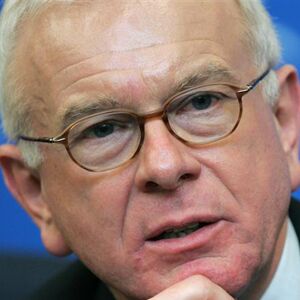
Conservatives Rule EU
The three main institutions of the European Union are now led by politicians from the center right. The presidencies of the Commission, Council and Parliament of the EU are now filled by politicians from the center-right European People’s Party (epp). This gives the conservatives an incredible opportunity to influence EU legislation and agenda.
A “historic coincidence” was how Hans-Gert Pöttering, the German Christian Democrat elected president of the European Parliament on January 16, described the situation.
The conservative triumvirate also includes fellow German Christian Democrat Chancellor Angela Merkel, in charge of the Council until the end of June, and the conservative European Commission president Jose Manuel Barroso. The trio is expected to build upon their already good personal relations in order to push some of the big issues where all three institutions have a say, such as the EU constitution.
On his election day, Pöttering said his top priority would be to help revive the proposed European Constitution. The constitution has been considered by many dead in the water since it was rejected in referenda in France and the Netherlands in 2005. Pöttering was also a strong advocate in the previously failed attempt to reference God and Christian values in the EU constitution.
The epp, the biggest party in the EU, is intent on capitalizing on this “historic coincidence.” The “epp has the privilege of leading the three main European institutions in the first half of 2007,” said epp president Wilfried Martens. He also stated he was looking forward to working with all three politicians during the EU’s political summits.
While center-right politicians are pleased with their strong position, politicians of other parties are obviously less ecstatic.
“We’re here to ensure that this will not change into a dangerous situation,” said Martin Schulz, the German president of the Socialist group, the second largest party in the EU Parliament.
Even more worrying for some is the amount of German influence in EU institutions. Two of the three top EU positions are filled by Germans, as well as the head of the second largest political party in the EU Parliament.
Some Parliament members have expressed concern about Germany’s strong influence in key legislative issues.
“I’m regularly accused by Martin Schulz of being anti-German,” said liberal group leader Graham Watson, from the UK. “I’m not … but it’s a fair point that parliament could perhaps be a little too vulnerable to the agenda being dominated by a single state.”
It will be worth watching the EU in the coming months, with such a strong conservative, and German, influence in its leadership. Expect a strong push for the EU constitution to be ratified in some form, a stronger defense of Christianvalues and stronger challenges to Turkey’s membership.
The Trumpet has issued strong predictions on European leadership turning to the political right, as well as the outcome of these hot issues in the EU. If you want to know the ultimate outcome of these issues, read Germany and the Holy Roman Empire.
